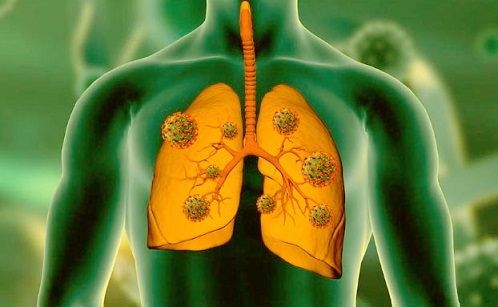The uniqueness of post-COVID lung fibrosis - The increased expression of ATP12A protein
Nikhil Prasad Fact checked by:Thailand Medical News Team Jul 24, 2024 8 months, 2 weeks, 6 days, 7 hours, 8 minutes ago
COVID-19 News: In a significant breakthrough, researchers from Michigan State University-USA and the Cleveland Clinic Florida Research & Innovation Center-USA have uncovered new details about lung damage following COVID-19. The study focused on the protein ATP12A and its increased expression in the lungs of patients with post-COVID-19 pulmonary fibrosis. This
COVID-19 News report delves into the findings and their implications for future treatments.
 The uniqueness of post-COVID lung fibrosis - The increased expression of ATP12A protein.
The Hidden Threat of Post-COVID Pulmonary Fibrosis
The uniqueness of post-COVID lung fibrosis - The increased expression of ATP12A protein.
The Hidden Threat of Post-COVID Pulmonary Fibrosis
Pulmonary fibrosis is a serious lung condition that causes the tissues in the lungs to become thickened and scarred, leading to severe breathing difficulties. While it shares similarities with idiopathic pulmonary fibrosis (IPF), a condition without a known cause, pulmonary fibrosis following COVID-19 has its own unique characteristics. Patients who had severe COVID-19 are at an increased risk of developing this condition.
What is ATP12A?
ATP12A is a protein subunit of the non-gastric H+, K+-ATPase, which is responsible for acidifying the surface liquid of the airways. In simpler terms, this protein helps regulate the pH levels in the airways, which is crucial for maintaining healthy lung function. The study investigated whether ATP12A expression is elevated in the lungs of patients who developed fibrosis after recovering from COVID-19.
Key Findings of the Study
The researchers examined lung samples from 18 patients who underwent lung transplantation. These included seven patients with post-COVID-19 pulmonary fibrosis and 11 patients with non-COVID-19-related fibrotic interstitial lung disease. The control group consisted of 12 healthy donor lungs. The findings were groundbreaking:
-Increased ATP12A Expression: The study revealed that ATP12A levels were significantly higher in the small airways of patients with post-COVID-19 pulmonary fibrosis compared to those with non-COVID-related fibrosis and healthy controls.
-Mucus Accumulation: The overexpression of ATP12A was linked to increased mucus accumulation in the airways. This thick, sticky mucus can obstruct the airways, making it difficult to breathe and increasing the risk of infections.
-Potential Therapeutic Target: The researchers demonstrated that inhibiting ATP12A using a potassium-competitive proton pump blocker, vonoprazan, could reduce the severity of fibrosis in experimental models. This suggests that targeting ATP12A might be a promising treatment strategy for post-COVID-19 pulmonary fibrosis.
The Research Process
To understand the role of ATP12A, the researchers used fluorescence immunohistochemistry and in situ hybridization techniques to analyze the lung tissues. They also conducted experiments on mice, which involved infe
cting them with a strain of SARS-CoV-2 and observing the effects on ATP12A expression and mucus production.
The study involved a collaborative effort from experts at Michigan State University, the Cleveland Clinic Florida Research & Innovation Center, and Corewell Health's Richard DeVos Heart and Lung Transplant Program. The detailed analysis provided compelling evidence of the protein's role in the post-COVID lung condition.
Understanding the Mechanisms
The study findings detailed how ATP12A contributes to the disease process. In normal lungs, ATP12A helps maintain a balanced pH in the airway surface liquid, which is crucial for proper lung function. However, in the case of fibrosis, the increased expression of this protein leads to a lower pH, making the mucus thicker and more difficult to clear from the airways. This obstruction can cause severe breathing difficulties and further lung damage.
Moreover, the study showed a strong correlation between ATP12A expression and mucus accumulation in the small airways, highlighting its role in the progression of post-COVID-19 pulmonary fibrosis.
Implications for Future Treatments
The study's findings open up new avenues for treating post-COVID-19 pulmonary fibrosis. By targeting ATP12A, it may be possible to reduce the severity of fibrosis and improve the quality of life for patients suffering from this debilitating condition. The use of vonoprazan, which successfully inhibited ATP12A in experimental models, represents a potential therapeutic approach that could be explored in clinical trials.
Looking Ahead
As the world continues to grapple with the long-term effects of COVID-19, understanding and addressing conditions like pulmonary fibrosis is crucial. This research provides valuable insights into the mechanisms behind post-COVID lung damage and offers hope for new treatment strategies. The collaborative efforts of the research teams from various institutions underscore the importance of continued scientific exploration in the fight against the lasting impacts of the pandemic.
The study findings were published in the peer-reviewed journal: American Journal of Respiratory Cell and Molecular Biology.
https://www.atsjournals.org/doi/full/10.1165/rcmb.2023-0419LE
For the latest
COVID-19 News, keep on logging to Thailand Medical News.
Read Also:
https://www.thailandmedical.news/news/long-term-lung-healing-even-after-mild-or-moderate-covid-19-many-could-develop-lung-fibrosis
https://www.thailandmedical.news/news/new-biomarker-discovered-for-progressive-pulmonary-fibrosis
https://www.thailandmedical.news/news/sars-cov-2-causes-ace2-downregulation-and-unique-fibrosis-that-contribute-to-long-covid-19
